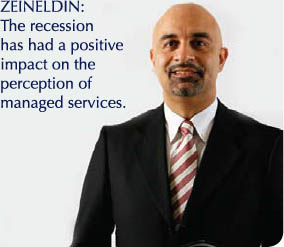
Interview with the CEO |
|

Yasser Zeineldin
CEO,
eHosting DataFort
Every
Cloud...
It’s one of those areas that analysts and industry watchers have been proclaiming will finally take off for the past couple of years. But as eHosting DataFort’s chief executive Yasser Zeineldin explains, while the recession may have hurt a number of industries, IT – and his company – have arguably prospered.
By Ben Furfie
Arabian Computer News - February 2011
If there is one topic that is guaranteed to dominate the headlines this year, it is cloud computing. Love it or hate it, there is no denying its potential to define the sector’s discourse for the next decade or so. But will it be a peaceful shift in power, or will we see a disruptive switch in the hegemony?
One of the companies that will help decide that is the Middle East’s very own eHosting DataFort, a company whose chief executive, Yasser Zeineldin is brutally honest about the potential of cloud, in particular, within the region.
His company is amongst the market leaders in the region for providing managed IT services, and closed 2010 with a number of high profile customer wins, and an important deal with Radix Technologies that opened up the company to the potential of reselling cloud computing services.
“We had a good number of new clients during 2010,” says Zeineldin. “For example, on the banking side, we were chosen by Société Générale to handle its IT infrastructure in the region. We also won contracts with Middle East hospitality giant Jumeirah Group, and the United Arab Emirates’ Ministry of Public Works.
“What the Radix Technology deal means for us is that – while we already had customers hosted in a cloud environment – we’ve been able to expand our services to others in the region,” he continues.
“We’ve also seen a boost to our disaster recovery offerings after we struck a deal with a company called Double Take. They basically do your data duplication, and disaster recovery planning.
“What that all means for our customers is that we can now offer the full spectrum of services, from a hardware, software and site perspective,” he adds, emphasising the company’s goal of becoming a one stop shop for businesses in the region looking for a IT services partner. However, he is keen to stress that the company isn’t solely focused on the quantity of services offered. “We live what we sell,” says Zeineldin. “We’re deliberately open with customers about what they need and what they don’t need. We have the benefits of economies of scale when it comes to maintaining a lead in terms of IT infrastructure, but if it is clear that a potential customer would do better to invest in their own infrastructure, we won’t shy away from admitting that.

“If I’m being honest, I think the sweet spot is three years. If you need to refresh quicker than that, then the capital expense makes it more costly than opting for managed services. However, if you don’t need to refresh that often, then the savings you might get through shifting costs to operational expenses will be negated, and it might end up costing you more,” he adds.
One of the questions Arabian Computer News is frequently asked is whether or not it is necessary to locate ‘remote’ IT services in your backyard.
“It is,” says Zeineldin when we put the question to him. “Obviously, you wouldn’t go with someone who can’t compete with the global giants, but we can. We can go toe-to-toe with the likes of Rackspace and hold our own without a problem,” he adds. “But the real reason why it is important to go with a local company is that you have the security of knowing your data is stored in a company that falls under local laws. For example, if you store your data with a US company, the government there can demand access to your data, and there is very little you can do to stop them.”

Concerns over data security are one of the main things holding back widespread adoption of managed services, analysts have warned, but Zeineldin is confident that this issue is close to being resolved. “If data security is important, then it isn’t necessary to store your data offsite. It is possible to lease services that provide excess processing power, and link them into internal storage.
I think as cloud computing becomes more accepted as a feasible method of managing IT infrastructures in the Middle East, we’ll see an increase in the number of companies managing their IT this way.”
One of the more interesting side effects of this new approach to managing IT infrastructures is the impact – or lack thereof – of the recession on eHosting DataFort’s business. “I think because managed services are seen as a way of saving money, we saw an increase in the number of customers willing to investigate the realities of the solution.
The recession, in a sense, helped us to break some of the misconceptions that surrounded managed service before it. I think it also shattered some of the worries surrounding how difficult it would be for Middle East businesses to bring in cloud,” he adds. “As cloud grows in the region, we’re well placed to help enterprises take advantage.”

IN NUMBERS
3 years
in a row, eHDF has been named IT services provider of the year
10
The company celebrates its tenth birthday in 2011
5
The number of ISO certifications the company holds in IT management